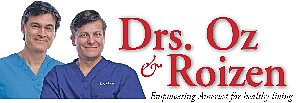Q: There's so much info out there about how to eat so that you slow aging. Can you sum it up so I can make sure I'm getting it right? -- Sally U., Joplin, Missouri
A: Your diet is an essential tool in the battle against premature aging and chronic disease. But you also want to combine it with stress management (without that, you may trigger epigenetic changes that speed aging and turn off immune protection against disease), establish a supportive posse, find a purpose in your life, get plenty of physical activity and adopt good sleep habits. The "6 Normals + 2" series of smart health goals that Dr. Mike has been outlining in his free newsletter at LongevityPlaybook.com can help you use these approaches to achieving a younger ActualAge.
Now, back to your question about an anti-aging diet. There's a lot of research showing that a minimally processed, plant-based diet can transform your health, as can eliminating inflammatory foods like added sugars and red and processed meats. And now, a new study that looked at the impact of the MIND diet on aging reinforces those guidelines. Using a program that evaluates more than 75 epigenetic biomarkers that reveal how fast a person's body is aging, researchers found that the MIND diet significantly slows down the body's overall pace of biological aging -- and lowers your risk of dementia.
The MIND diet suggests 3 or more servings a day of whole grains; 1 or more servings a day of vegetables (other than green leafy); 6 or more servings a week of green leafy vegetables; 5 or more servings a week of nuts; 4 or more meals a week of beans; 2 or more servings a week of berries; 2 or more meals a week of poultry; 1 or more meals a week of fish; and mainly olive oil if adding fat.
We advocate having five consecutive days a month of a low-protein, 750-calorie diet, then following the MIND diet the rest of the time. For more info, see Dr. Mike's book, "The Great Age Reboot." Also read "5 Supplements for Anti-Aging" at iHerb.com's blog.
Q: I'm emotionally exhausted by everything from COVID-19 to war and contending with my own and my family's health problems. It's making me get sloppy at work and short-tempered at home. How can I regain emotional strength? -- Steven B., Nashville
A: Emotional strength (resilience) can be cultivated, and it allows you to contend with what life throws at you. While no one can dodge challenges, disappointments and sadness, how you respond to those events and circumstances is in your control.
The first step is to practice mindful meditation and/or breathing exercises for 10 minutes in the morning and before bedtime. That will help dispel stress and clear your mind so that you can think of resourceful ways of handling your issues. Another great approach, outlined in Dr. Oz's iHerb.com blog, "Dr. Oz's 9-Step Daily Wellness Routine" is to practice gratitude. When heading to bed, write down something that makes you grateful and think about a loved one you should call the next day, giving you extra purpose when you rise and shine.
Finding a cause to promote that helps others improve their quality of life will also boost yours.
Physical activity can also raise your spirits -- it dispels stress and promotes neurotransmitters that stimulate happiness. Even a short burst of jumping jacks or a moderate-intensity walk for 15 minutes helps. And joining a team activity gets you receiving from and giving support to other folks.
Keeping a journal is also helpful. It lets you express your feelings bluntly, then look at them and reevaluate how you are reacting. And if you want to try talk therapy, check out the American Psychological Association's Psychologist Locator. You might also get a health check-up to make sure that your emotional exhaustion isn't being caused or fueled by physical problems such as anemia, diabetes, sleep apnea, or allergies. And take a daily probiotic and/or eat fermented foods -- they really your boost moods and help you gain more resilience.
Dr. Mike Roizen is the founder of www.longevityplaybook.com, and Dr. Mehmet Oz is global advisor to www.iHerb.com, the world's leading online health store. Roizen and Oz are chief wellness officer emeritus at Cleveland Clinic and professor emeritus at Columbia University, respectively. Together they have written 11 New York Times bestsellers (four No. 1's).
King Features Syndicate

